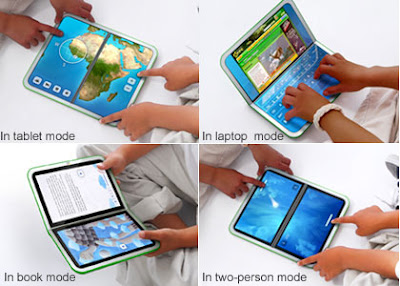Submitted June 6, 2008 - 08:09.
I think the OLPC 2.0 is what the UMPC's should be. I agree, it is the future of notebook computers and computing in general. Even if it costs $200, IMO - it will be worth it.
future?
Submitted June 6, 2008 - 08:32.
A few years back the floppy drive on a laptop the school owned failed. I contacted the maker and was told 750.00 for the floppy drive replacement. That was excessive so I purchased a recertified one from a firm in Tx. That floppy drive also failed in about 45 days. I called the firm in Tx and I was told that there was only a 30 day warranty on the 500.00 recertified drive. They decided not to replace the floppy and instead upgrade the memory. The memory upgrade cost close to 750.00. Then they passed the laptop off on another user who promptly called me and wanted the floppy drive replaced. I told them about the money already spent and they still wanted the floppy drive replaced. I found another floppy drive from another vendor in Ca. and that only was 450.00 but that floppy lasted longer then the recertified one and it had a year warranty.
Submitted June 6, 2008 - 08:44.
Give up the mouse and an actual keyboard? I wonder how long that will last...
Submitted June 6, 2008 - 08:47.
I suspect that as long as people continue to use tactile -- and therefore separate -- keyboards, they will continue to use some physical mouse equivalent distinct from the screen. A mouse near the keyboard rather than a foot away on the screen is much more ergonomically acceptable and faster to use. Therefore I do not expect the mouse to disappear before the keyboard.
But in a few decades I don't expect separate keyboards to be common at all. Rather, I think vocal or subvocal speech recognition or some other more direct technology will have replaced using the fingers to enter text one letter at a time.
Submitted June 6, 2008 - 10:23.
The OLPC is probably a footnote at this point in time. Why?
They decided to, effectively, abandon their revolutionary Sugar OS for--Microsoft. This has resulted in a loss of support from the FOSS community and necessarily changes a unique, hardware-light foray into new territory into an underpowered just-another-box.
It's clear that our entire model has to change to give us anything really new--face it, a programmer or user from 1950 would recognize today's character-by-character keyboard entry. A mouse wouldn't be any real shocker, either.
But the entire paradigm of Windows is going to be a real stretch to a kid in the third world--which was a major premise of Sugar.
One step forward, two steps back.
The comments indicate an immediate, visceral reaction on the part of people who have vocal, detailed, and emotional responses; and yet, the original inspiration and dream of the project is a sound humanitarian, and fascinating endeavor.
What is the reality?
The OLPC project is a wonderful dream and a worthwhile project that I've been interested in consistently over time. If the aims of the OLPC group could be realized it would be a fabulous accomplishment. The commentators have sound points to make though. The project never realized its cost limitations and a healthy part of their vision was lost with the decision to abandon open source technology.
While we debate whether the glass is half empty or half full the kids who could benefit from the technology are helped enormously. That is why I remain hopeful that at least some of the less grandiose but realistic plans of the OLPC project can be realized.
The different modes of the next-gen OLPC laptop.
Graphic source: One Laptop per Child







